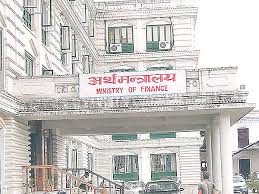Budget to focus on reviving COVID-crushed economy

Kathmandu / Apr. 12: Finance Minister Bishnu Prasad Paudel has said that the upcoming budget would focus on recovery of the economy battered by the COVID-19 pandemic.
“We are working on the preparation of budget for the coming fiscal year giving top priority to address COVID-19 impacts in economic recovery programmes and accelerate economic growth,” he said while launching Nepal Development Update made public by the World Bank virtually on Monday.
He believed that the Nepal Development Update had provided timely and practical suggestions to address the existing development challenges.
“We are now working to further develop the green, resilient and inclusive development agendas that would help Nepal spring back better from the pandemic with the cooperation and support from development partners and relevant stakeholders,” he said
Stating that current Nepal Development Update highlighted Nepal’s untapped exports potential of around USD 9.2 billion which can create about 220,000 new jobs, he said the government is indeed positive to discuss and make necessary policy arrangements for realising this potential.
The government has been working seriously to reduce the trade deficit by increasing exports, he added.
Finance Minister Paudel said that the government was working to save the Nepali people and economy from the second wave of COVID-19 pandemic.
“Nepal’s economy is growing at a steady pace,” he said, adding that “the government of Nepal is resolving this issue in a sensible way with the interest and support of the people here.”
He also said that the government was working to administer the second dose of vaccine to the citizens who have been vaccinated once and to provide the vaccine to the citizens who have not been vaccinated even once.
“We are committed to work together with the WB and other major development partners for economic recovery, socio-economic transformation and economic growth,” he said.
The present update has shown concern that the current political scenario could adversely affect future investment and economic activity, he said, adding that all political issues are being resolved within the constitutional framework.
He urged people and other concerned development partners not to be worried about it citing that it would not have any impact on economic policies.
Export competitiveness key to Nepal’s green, resilient, and inclusive recovery: WB
The Nepal Development Update of WB projected the Nepali economy to grow by 2.7 per cent in the current fiscal year 2020/21, driven primarily by services as social distancing measures continue to be relaxed and vaccines rolled out for priority populations.
Agriculture is also expected to perform well, on the back of recent favourable monsoons, the report said.
Exports could be a powerful platform to boost post-pandemic recovery and enable Nepal to transition towards green, resilient, and inclusive development, stated the World Bank’s latest Nepal Development Update.
The update noted that the tourism sector may not fully recover without reforms to readjust to a post-COVID-19 tourism market.
The current account deficit is expected to widen marginally in the current fiscal year to 1.2 per cent of GDP as imports and remittances recover modestly while exports remain tepid.
Revenue performance is also expected to remain weak.
This coupled with additional spending on economic relief measures, vaccinations, and the resumption of project implementation should contribute to increase the fiscal deficit close to 7 per cent of GDP in the fiscal year 2020/21.
“Nepal’s untapped export potential is estimated to be around US$9.2 billion, 12 times its actual annual merchandise exports,” said Dr. Kene Ezemenari, World Bank Senior Economist and lead author of the update.
“This export potential represents an opportunity to create an estimated 220,000 new jobs, with significant implications for productivity growth. Realising that potential is not unrealistic in the medium term.”
The report outlines six key priorities for Nepal to achieve its export potential.
These include reforming the tourism sector for a quick and resilient recovery, simplifying and streamlining processes to attract more foreign direct investment, modernising export promotion and upgrading exporters’ capabilities, reducing trade costs and boosting digital trade and e-commerce for more opportunities linked to global value chains.
“We welcome the government’s planned reforms to support Nepal’s green, resilient, and inclusive development. This will be the foundation for Nepal to emerge stronger from the crisis,” stated Faris Hadad-Zervos, World Bank Country Director for Maldives, Nepal, and Sri Lanka.
“We look forward to continued collaboration with the government and development partners in this effort, particularly on investments that harness Nepal’s export potential to support a sustainable and resilient recovery.”
